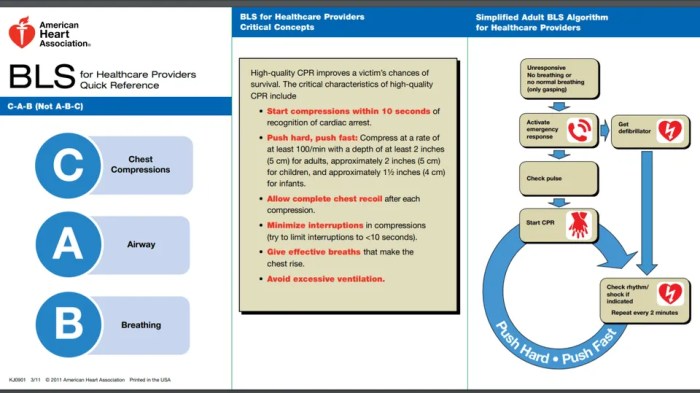Acls final exam answers 2022 – Prepare to conquer the ACLS Final Exam 2022 with this comprehensive guide. We’ll dive into the exam’s intricacies, unveil effective preparation strategies, and provide expert tips to maximize your performance.
As you embark on this journey, remember that success lies not only in mastering the content but also in honing your test-taking skills. This guide will equip you with the knowledge and confidence to excel in both aspects.
Exam Overview

The ACLS final exam is a comprehensive assessment of a candidate’s knowledge and skills in Advanced Cardiovascular Life Support. It evaluates their ability to recognize and manage life-threatening cardiovascular emergencies.
The exam consists of multiple-choice questions, scenario-based questions, and hands-on skills stations. Candidates have a limited time to complete the exam, which is typically administered at the end of an ACLS course.
Registration and Preparation
To register for the ACLS final exam, candidates must first complete an accredited ACLS course. They can then contact their course provider or the American Heart Association (AHA) to schedule an exam date.
Preparation for the exam involves reviewing the course materials, practicing skills, and taking practice exams. The AHA provides a variety of resources to help candidates prepare, including study guides, online practice exams, and mock scenarios.
Core Content Areas
The ACLS final exam covers a wide range of core content areas, each of which is essential for effective ACLS practice. These areas encompass the knowledge and skills required to recognize, assess, and manage cardiac arrest and other life-threatening emergencies.
By mastering these core content areas, healthcare professionals can enhance their ability to provide timely and effective interventions, improving patient outcomes and reducing the risk of adverse events.
Assessment and Recognition
This area focuses on the prompt recognition and assessment of cardiac arrest and other life-threatening emergencies. It covers topics such as:
- Identifying signs and symptoms of cardiac arrest
- Performing a rapid and accurate primary assessment
- Establishing and maintaining an airway
- Recognizing and managing reversible causes of cardiac arrest
Management of Respiratory Emergencies
This area addresses the management of respiratory emergencies, including airway management, oxygen therapy, and mechanical ventilation. Key topics include:
- Techniques for airway management (e.g., bag-valve-mask ventilation, intubation)
- Indications and administration of oxygen therapy
- Principles of mechanical ventilation
li>Management of specific respiratory emergencies (e.g., asthma, COPD, pneumonia)
Management of Cardiac Arrhythmias
This area covers the recognition, interpretation, and management of cardiac arrhythmias. It includes topics such as:
- Interpreting electrocardiograms (ECGs)
- Identifying and classifying cardiac arrhythmias
- Administering antiarrhythmic medications
- Performing defibrillation and cardioversion
Pharmacology
This area addresses the pharmacology of medications used in ACLS, including their indications, dosages, and side effects. It covers topics such as:
- Vasopressors and inotropes
- Antiarrhythmic medications
- Sedatives and analgesics
- Emergency antidotes
Advanced Airway Management
This area covers advanced airway management techniques, including endotracheal intubation and surgical airway management. It includes topics such as:
- Indications and contraindications for endotracheal intubation
- Techniques for endotracheal intubation
- Management of difficult airways
- Performing surgical airway management (e.g., cricothyrotomy)
Post-Cardiac Arrest Care
This area focuses on the management of patients after cardiac arrest, including postresuscitation care, temperature management, and neurological assessment. It covers topics such as:
- Initial postresuscitation care
- Temperature management strategies
- Neurological assessment and prognosis
- Management of complications after cardiac arrest
Exam Preparation Strategies

Preparing for the ACLS final exam requires a comprehensive approach. Effective study techniques, time management, and stress management strategies can enhance your preparation and increase your chances of success.
To begin, prioritize the core content areas covered in the exam. Use your study materials to identify the key concepts and focus on understanding them thoroughly. Practice answering exam-style questions to assess your comprehension and identify areas that need improvement.
Time Management, Acls final exam answers 2022
Plan a realistic study schedule that allows ample time for each topic. Break down large chunks of information into smaller, manageable segments to avoid feeling overwhelmed. Use a timer to stay focused during study sessions and take regular breaks to refresh your mind.
Practice Materials
Utilize practice tests and simulations to familiarize yourself with the exam format and question types. These materials provide valuable insights into the level of difficulty and allow you to identify areas where you need further preparation. Practice tests also help you develop your test-taking skills and improve your time management.
Handling Exam Anxiety
It is natural to experience some anxiety before an exam. However, excessive stress can hinder your performance. Practice relaxation techniques such as deep breathing exercises or meditation to calm your nerves. Visualize yourself succeeding on the exam to boost your confidence.
Test-Taking Techniques: Acls Final Exam Answers 2022

Test-taking strategies can help you perform better on the ACLS final exam. It’s important to read questions carefully, manage time effectively, and answer different question types appropriately. Avoid common pitfalls and maximize your exam performance by implementing these strategies.
If you’re still struggling with your ACLS final exam answers 2022, don’t worry! There are plenty of resources available to help you out. For example, you can check out our article on the opposite of nord in french . This article provides a comprehensive overview of the topic, and it’s sure to help you understand the concepts that you need to know for your exam.
So what are you waiting for? Start studying today!
Reading Exam Questions Carefully
Read each question thoroughly before answering. Identify the key concepts and instructions. Determine the type of question (e.g., multiple-choice, true/false, short answer). Highlight or underline important information.
Rephrase questions in your own words to enhance understanding.
Managing Time Effectively
Manage your time wisely during the exam. Allocate time for each question based on its difficulty. Start with easier questions to build confidence and save challenging ones for later. Pace yourself to avoid rushing or spending too much time on any single question.
Answering Different Question Types
Different question types require specific strategies. For multiple-choice questions, eliminate incorrect answers first. For true/false questions, justify your answer with a brief explanation. Short answer questions should be concise and focused, addressing the specific points requested.
Avoiding Common Pitfalls
Avoid common pitfalls that can hinder your exam performance. Don’t guess blindly; if you’re unsure, skip the question and return to it later. Don’t overcomplicate questions; look for the simplest and most straightforward answer. Manage your stress levels and stay calm throughout the exam.
Exam Grading and Results
The ACLS final exam is graded on a pass/fail basis.
Grading System
To pass the exam, candidates must correctly answer a minimum of 84% of the questions.
Receiving and Interpreting Results
Exam results are typically available within 24-48 hours of completing the exam.
Candidates will receive an email notification with a link to their exam results.
The results will indicate whether the candidate passed or failed the exam.
Implications of Passing or Failing
Passing the ACLS final exam is required for certification as an ACLS provider.
Candidates who fail the exam will need to retake the course and exam.
Q&A
What is the purpose of the ACLS Final Exam?
The ACLS Final Exam assesses your knowledge and skills in Advanced Cardiovascular Life Support, ensuring you can effectively manage cardiac emergencies.
How long do I have to complete the exam?
The exam typically lasts around 2 hours, providing ample time to demonstrate your proficiency.
What resources are available to help me prepare?
Utilize official study materials, attend review courses, and practice with mock exams to enhance your readiness.